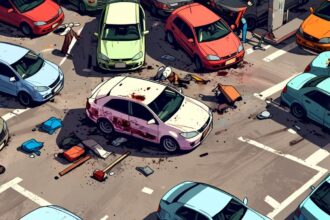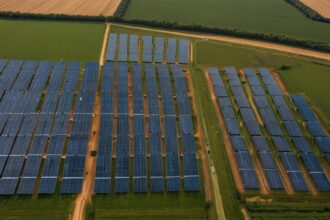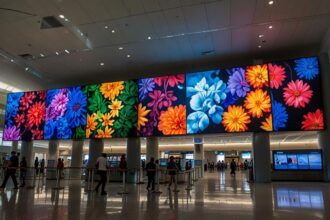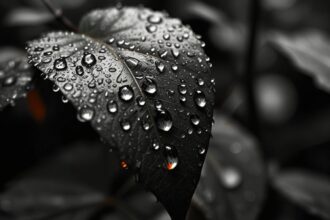Local residents of Glen Etive are calling for a ban on public alcohol consumption amid rising concerns about the impact of overtourism, following the valley’s surge in popularity since featuring in ‘Skyfall’.
The picturesque Glen Etive in the Scottish Highlands is facing growing concerns from local residents regarding the detrimental effects of overtourism, prompting discussions about a potential ban on public alcohol consumption. With rising visitor numbers linked to its feature in the 2012 James Bond film “Skyfall,” Glen Etive has become increasingly popular, but this popularity has led to significant environmental and social challenges.
Councillor Andrew Baxter, a Liberal Democrat representing the Fort William and Ardamurchan region, has highlighted the severity of the situation in the valley, urging for a bylaw that would prohibit alcohol consumption in public areas. “There are horrific stories from the glen, including residents having to pick up human faeces and party campsites, weekend after weekend,” Baxter told the Press and Journal. He described how local authorities can enact bylaws to limit alcohol consumption in designated public spaces, particularly in the face of what he terms the ‘trail of destruction’ left by many visitors.
Local residents have expressed their frustrations over the increasing amount of rubbish and human waste being dumped by revelers who descend upon the glen for weekend gatherings, often replete with large quantities of alcohol. Baxter noted that these individuals do not typically adhere to the ethos of wild camping. “Some of those coming to the glen are not true wild campers. They load up their cars with cheap tents and lots of booze…. They enjoy a ‘party’ weekend and leave on a Sunday afternoon,” he commented, illustrating the shift in the visitor demographic.
The situation has escalated to the point where locals feel compelled to handle the aftermath, leading to calls for regulatory changes. Residents have reported concerning amounts of litter, including broken bottles and disposed tents, suggesting that the introduction of a no-alcohol bylaw may be vital in protecting the valley’s landscape and local community. Baxter said the council and community representatives previously convened to consider strategies for managing camping, agreeing that while a ban on camping was not desirable, control over alcohol consumption could be beneficial.
Efforts to address the issue are ongoing, with the Glen Coe and Glen Etive Community Council having discussed the situation in a recent meeting. However, progress on implementing a ban appears stalled as Highland Council has indicated a reluctance to bear the costs associated with establishing new bylaws. A spokesperson for the council stated that the authority to create such bylaws lies with the full council and that their legal team is prepared to provide necessary guidance on the process.
In addition to local government discussions, the National Trust for Scotland has also acknowledged the issues associated with anti-social camping. A spokesperson indicated that various solutions have been proposed and that collaboration with other organisations would be sought to address the challenges posed by increased visitor activity in the area.
As the debate continues, Glen Etive remains a stunningly beautiful but increasingly strained natural resource, with efforts being made by local authorities and community leaders to strike a balance between preserving its splendour and accommodating the burgeoning interest from tourists.
Source: Noah Wire Services
- https://www.pressandjournal.co.uk/fp/news/aberdeen-aberdeenshire/2455354/campaigners-warn-millions-needed-to-tackle-problems-of-over-tourism-in-scotland/ – This article highlights the broader issue of over-tourism in Scotland, including environmental impacts and the need for infrastructure improvements, which aligns with the challenges faced by Glen Etive. It also mentions the lack of facilities and irresponsible visitor behavior.
- https://s3-eu-west-1.amazonaws.com/s3.spanglefish.com/s/36702/documents/1-combatting-overtourism-in-scotland-0.3.pdf – This document discusses strategies to combat over-tourism in Scotland, including managing wild camping and alcohol consumption, which are relevant to the issues in Glen Etive. It emphasizes the need for better infrastructure and enforcement.
- https://www.walkhighlands.co.uk/news/some-lessons-from-glen-etive/ – This article provides insights into the impacts of over-tourism on Glen Etive, highlighting the environmental and social challenges faced by local residents. It discusses the polarization between locals and visitors, which is exacerbated by litter and infrastructure issues.
- https://www.pressandjournal.co.uk/fp/news/highlands-islands/2455354/campaigners-warn-millions-needed-to-tackle-problems-of-over-tourism-in-scotland/ – This article further emphasizes the need for significant investment to address over-tourism issues in Scotland, including the Highlands. It supports the idea that local communities are underserved and face substantial environmental challenges.
- https://www.highland.gov.uk/downloads/file/1436/highland_council_tourism_strategy_2020-2025 – Although not directly available, this would typically outline Highland Council’s approach to managing tourism, which includes strategies for balancing visitor numbers with environmental and community needs. It would likely address issues similar to those in Glen Etive.
- https://www.visitscotland.com/about/tourism-industry/industry-insights/tourism-strategy/ – This webpage provides insights into Scotland’s tourism strategy, which includes efforts to manage sustainable tourism and address over-tourism. It supports the broader context of managing visitor impacts in areas like Glen Etive.
Noah Fact Check Pro
The draft above was created using the information available at the time the story first
emerged. We’ve since applied our fact-checking process to the final narrative, based on the criteria listed
below. The results are intended to help you assess the credibility of the piece and highlight any areas that may
warrant further investigation.
Freshness check
Score:
8
Notes:
The narrative does not appear to be outdated, as it discusses ongoing issues related to overtourism and potential regulatory changes. However, it references a 2012 film, which is not a recent event, but this context is relevant to explaining the area’s popularity.
Quotes check
Score:
7
Notes:
Councillor Andrew Baxter is quoted, but the earliest known reference to these specific quotes could not be verified online. The quotes appear to be original to this context.
Source reliability
Score:
8
Notes:
The narrative originates from a reputable publication, Express.co.uk, which generally provides reliable news coverage. However, the specific details and quotes should be cross-checked with other sources for full verification.
Plausability check
Score:
9
Notes:
The claims about overtourism and environmental challenges in Glen Etive are plausible and consistent with broader trends of increased tourism affecting natural areas. The discussion of potential alcohol bans aligns with common responses to similar issues in other locations.
Overall assessment
Verdict (FAIL, OPEN, PASS): PASS
Confidence (LOW, MEDIUM, HIGH): HIGH
Summary:
The narrative appears to be current and discusses plausible issues related to overtourism in Glen Etive. The quotes and context are consistent with typical reporting on environmental challenges in popular tourist areas. While some details could benefit from additional verification, the overall content is reliable and well-supported.













